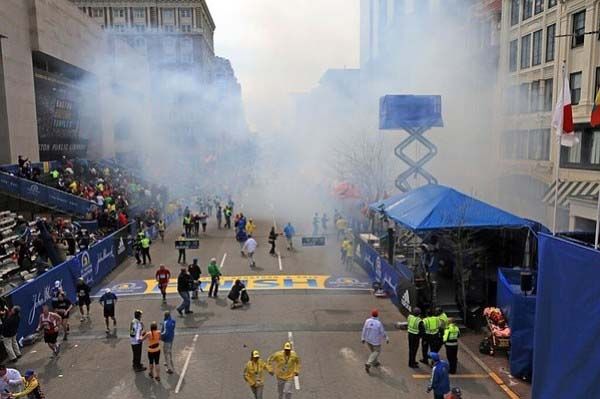Every person who witnessed the bombing, survived it, and especially those who were first responders, either professionally or voluntary, are all victims of a heinous act of terror.
Today, two days past the bombing reality is hitting those people. Shock and adrenalin is wearing off. Chances are they aren’t sleeping well and when they are able to finally doze off out of exhaustion they dream images of the nightmare they witnessed. They see the eyes of that person they kept telling, “stay with me, look at me, look at me, you’re going to be okay.” After enough times of awakening with a racing heart, crying before you’re even fully awake you start to fight sleep. A task as simple as walking into a grocery store is too overwhelming to your senses. You feel like you’re going crazy.
Survivors of the Boston Marathon terror attacks now face risk of developing post traumatic stress disorder, experts warn. (warning-very graphic photo)
Dr Harry Croft, a San Antonio-based psychiatrist, who has treated more than 7,000 former soldiers, said the symptoms would be widespread in the immediate aftermath of the attacks.
‘If it lasts more than a month, and has enough symptoms, it is then described as PTSD,’ he told NBC News.
Initial symptoms often include a sense of disbelief, said Dr Croft, as the experience takes on an almost imaginary aspect. Following that victims either become emotionally numb, or gush with sadness, fear or anger about the horrors they have experienced.
As much as you want to control your brain the images come. Tearing that shirt apart to wrap around the groin so that little girl doesn’t bleed to death.
Trying to calm yourself with a hot bath and breaking down in tears as you see your right foot. That being enough to trigger the image of that little girl with only a piece of her pinky toe left hanging from the side of her right foot.
The image of the 18 year old girl stepping up to help do whatever needed to help you keep that little girl from bleeding to death and going into shock. When you remember the look in your helpers eyes it mirrors reality, the horror, the fear that has to be driven to the deepest parts of your being at that moment so that little girl believes you with all her heart and soul when you answer her question, “Am I going to die?” and you tell her, “no honey, you’re not,just keep talking to me, look at me, you’re going to be okay.” And even in the moment you know that none of you will ever really be okay again.
Once an injury that results in the loss of a limb occurs there are only so many miracles even the best Dr. can pull off. But you battle between the logical reality of that and the thoughts of “was there something I did at the scene that kept the outcome from being better?”
In the days that follow you rush to the phone hoping and praying it’s more good news after the fifth surgery in four days that the little girl has undergone, only to hear a media person on the other end. You think thoughts of violence and words come out of your mouth that horrify you. And then you hang up the phone, sit and sob, and pray.
Days pass, weeks pass, those weeks turn into months. If you’re lucky you’ve realized that what you experienced has left you with PTSD. You find venues to talk, to process. Even with that support the feeling of losing control going insane can return within seconds at the sound of a Life Flight helicopter going over your home, or even a family member with a minor cut from slicing cucumbers.
Time will go on, the little girl survives, you think you’re okay. Then eight years later you sit down to watch what the rest of America is watching with sadness and horror and you suddenly find yourself balling, sobbing. “What the hell, am I losing my mind?” Then you remember what you learned, you’re not crazy, you’re a human having a very normal reaction to a very abnormal traumatic event that are psyches aren’t designed to absorb.
Healing comes but it takes more than willpower and it takes each of us around that person to understand, listen, not judge.
Listen, listen, listen, let them cry, let them sit in silence. Reassure them that even though you’ll never know what it’s like it’s okay for them to not be okay at that moment.
My heart aches for those who died and their families. But we must remember that an incident like this is like throwing a huge boulder into water, the ripples reach out and touch countless places. Even if that boulder didn’t hit you directly, the waves it produces knocks you off course and at times you feel like you are going to sink.
It is us who must be sure to reach out to those uncounted victims and make sure they get the support and resources they are going to need in the days, weeks, and even years to come.
And I cannot close on this topic without saying that we must remember that our soldiers experience this daily in active duty. The blood, the body parts, and loss of life of their fellow soldiers and even civilians are a daily part of most of our troops. There is no break from it until they come home. Imagine one day of Boston times 365. That alone is why we have to continue to fight like hell for these men and women.
Just surviving is not the ultimate goal, learning to live with what is handed us is.
That journey is much easier shared.
In the Boston area Brookline Community Mental Health Center has set up services to help volunteers with PTSD in the aftermath of the bombing.
Other PTSD resources:

